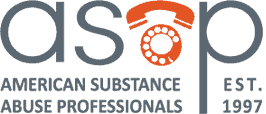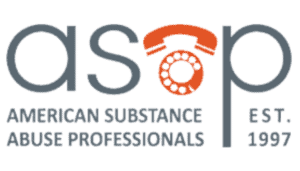Department of Justice
Drug Enforcement Administration
21 CFR Part 1308
Schedules of Controlled Substances: Rescheduling of Marijuana
Reference: [Docket No. DEA-1362; A.G. Order No. 5931-2024]
Dear Attorney General Merrick B. Garland,
American Substance Abuse Professionals, Inc. (ASAP) is grateful for the opportunity to respond to the U.S. Drug Enforcement Administration (DEA) Notice of Proposed Rulemaking (NPRM) regarding the Rescheduling of Marijuana under the Controlled Substance Act (CSA). ASAP is a national organization supporting Department of Transportation (DOT), Nuclear Regulatory Commission (NRC), and general workplace employees needing assistance with a drug and/or alcohol use with our expert Substance Abuse Professionals (SAPs) since 1997. ASAP provides expertise and education in substance use risk management for employers and employees maintaining public and workplace safety. Addiction is a set of complex issues with endless ways of showing itself. The Substance Abuse Professional (SAP) plays a critical role in protecting public safety from issues of drug and alcohol use. They act as the “gatekeeper” under DOT and NRC guidelines by evaluating the employee to determine recommendations and readiness to return to safety sensitive duty.
ASAP understands the necessity to reclassify marijuana allowing for medical and research opportunities. Reclassification would provide the opportunity to research an impairment standard for cannabis similar to what we have for alcohol today. Until an impairment standard is established for cannabis, current drug testing for cannabis of safety-sensitive employees under DOT and NRC is critical to public safety.
The rulemaking unfortunately is being proposed prior to formulating the necessary exception (carve out) to continue drug testing programs including cannabis for safety-sensitive employees falling under Department of Transportation (DOT) and Nuclear Regulatory Commission (NRC). Health and Human Services (HHS) dictates the drug testing panels for the DOT and NRC only include Schedule I and II. If Marijuana is rescheduled to Schedule III, it will fall off the drug testing panel for DOT and NRC adversely impacting our nation’s safety. Established and effective drug and alcohol testing programs by DOT and NRC are in place to deter misuse by safety-sensitive employees, in turn reducing accidents and protecting Americans. Absent a carve out to continue cannabis testing under DOT and NRC, there will be no deterrent to on-duty cannabis use by our nation’s truckers, school bus drivers, train conductors, pilots, flight and ground crews, and workers with nuclear security access. Neglecting to address this regulatory oversight creates a wholly unnecessary and critical safety risk to the American public.
Here are some alarming statistics based on cannabis effecting safety-sensitive employees and out nation.
- The American Trucking Association (ATA), the largest trucking association, issued the following statement regarding the DEA NPRM, “While perceived intoxication may only last a few hours, cognitive impairment from marijuana – impacting core motor skills, coordination, perception, and peripheral vision that are critical to safe, focused driving – has been found to last up to 24 hours in some instances.1 Thus, in the absence of an impairment standard, it remains critically important that employers retain the ability to test for marijuana use in safety-sensitive contexts like trucking.”2
- “Research suggests waiting 6 hours after using cannabis before driving. However, effects from edibles can be delayed, and last up to 12 hours. If you’ve mixed cannabis with other substances like alcohol, plan to wait even longer before driving.”4 Issued by Maryland.gov.
- The Federal Motor Carrier Safety Administration (FMCSA) Clearinghouse database recorded 244,751 instances of drug and/or alcohol violations among safety-sensitive drivers possessing a Commercial Driver’s License (CDL). Of these violations, 62% were related to marijuana use, based on the April 2024 monthly report.5
- In 2023, research by the National Transportation Safety Board (NTSB) released research showing that marijuana and alcohol remain the most-detected drugs in impaired driving crashes resulting in serious or fatal injuries.6
- The infamous train collision in Chase, MD in 1987, which killed 15 people, injured 174 others, was linked to marijuana use, contributing to the implementation of DOT drug testing.7
- A publication from the University of Maryland Extension asserts, “contrary to popular belief, it is possible to develop an addiction to marijuana. It is estimated that up to 30% of marijuana users are addicted (Hasin et al., 2015).”3
- Maryland legalized cannabis July 2023 educating the public that, “studies have linked cannabis use, especially frequent use with cannabis use disorder and addiction, anxiety and paranoia, and psychosis.”7
- According to the National Safety Council (NSC), “Cannabis is the most frequently used illicit drug in the U.S., with an estimated 43.5 million past-year users age 12 or older in 2018.”8
- A published study in the National Journal of Medicine found a 5% increase in injury crash rates and a 2.3% increase in fatal crash rates associated with state-level marijuana legalization as presented by Senator Ted Cruz on May 22 at the Senate Commerce Subcommittee Hearing.9
A survey was conducted by the American Addiction Centers, concerning trends regarding cannabis use in the workplace. Over 20% of respondents admitted to using cannabis recreationally during work hours. Nearly 5% of respondents reported daily cannabis use during work hours. More than 13% of respondents confessed to using cannabis recreationally more than once a month while at work. These findings underscore the need for robust workplace drug and alcohol testing policies and education initiatives to address the potential risks associated with cannabis use during work hours, particularly in safety-sensitive environments.8
In conclusion, if the reclassification of marijuana from Schedule I to Schedule III takes place, ASAP is urging for some form of safety-carve out to be issued to maintain cannabis testing by the Department of Transportation (DOT), the Nuclear Regulatory Commission (NRC), and safety-sensitive workplaces as a deterrent against substance misuse by safety-sensitive employees as a means to protect the traveling public.
Sincerely,
Laura Lacey Dashner, LCSW, Chief Executive Officer
Nicole Hanratty, CEAP, SAP, SAE, Chief Operating Officer
Sandra Serrano, Chief Development Officer
American Substance Abuse Professionals, Inc.
Take ACTION today – Contact your Senator and U.S. Representatives!
Click Here to Contact U.S. Senators
Click Here to Contact U.S. Representatives
DEA NPRM – Schedules of Controlled Substances: Rescheduling of Marijuana
____________________
1 Lauren Eadie et al., “Duration of Neurocognitive Impairment with Medical Cannabis Use: A Scoping Review,” Frontiers in Psychiatry 12 (March 12, 2021), https://doi.org/10.3389/fpsyt.2021.638962.
2 American Trucking Association (ATA) Lettera; https://ata.msgfocus.com/files/amf_highroad_solution/project_2358/ATA_Letter_Marijuana_Rescheduling_5.15.24_FINAL_1.pdf
3 University of Maryland Extension. (2023, November 20). Legalized Recreational Marijuana Use in Maryland. Legalized Recreational Marijuana Use in Maryland (FS-2023-0670). https://extension.umd.edu/resource/legalized-recreational-marijuana-use-maryland-fs-2023-0670/
4 Maryland.gov. (n.d.). Drugged Driving — Take it seriously. Respect the effect. Be Cannabis Smart. https://cannabis.maryland.gov/Pages/BeCannabisSmart.aspx
5 U.S. Department of Transportation Federal Motor Carrier Safety Administration. (2024, April). April 2024 Monthly Summary Report. Drug & Alcohol Clearinghouse. https://clearinghouse.fmcsa.dot.gov/content/resources/Clearinghouse_MonthlyReport_April2024.pdf
6 National Highway Traffic Safety Administration. (n.d.). Drug-Impaired Driving. United States Department of Transportation . https://www.nhtsa.gov/risky-driving/drug-impaired-driving
7 Robinson, L. (2015, May 13). Look back: Trains collide in Chase in 1987, killing 15. WBALTV11. https://www.wbaltv.com/article/look-back-trains-collide-in-chase-in-1987-killing-15/7093564
8 Cannabis and the Workplace. National Safety Council and NORC. (n.d.). https://www.nsc.org/getmedia/98353804-f383-4086-b021-edbfb1d5d7a5/cannabis.pdf
9 American Trucking Associations. (n.d.). American Trucking Associations. LinkedIn. https://www.linkedin.com/posts/ata_marijuana-and-alcohol-are-the-most-detected-activity-7199757031807795200-M2Qk/?utm_source=share&utm_medium=member_desktop



